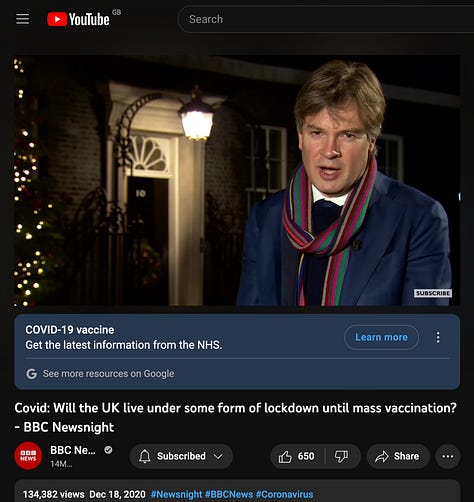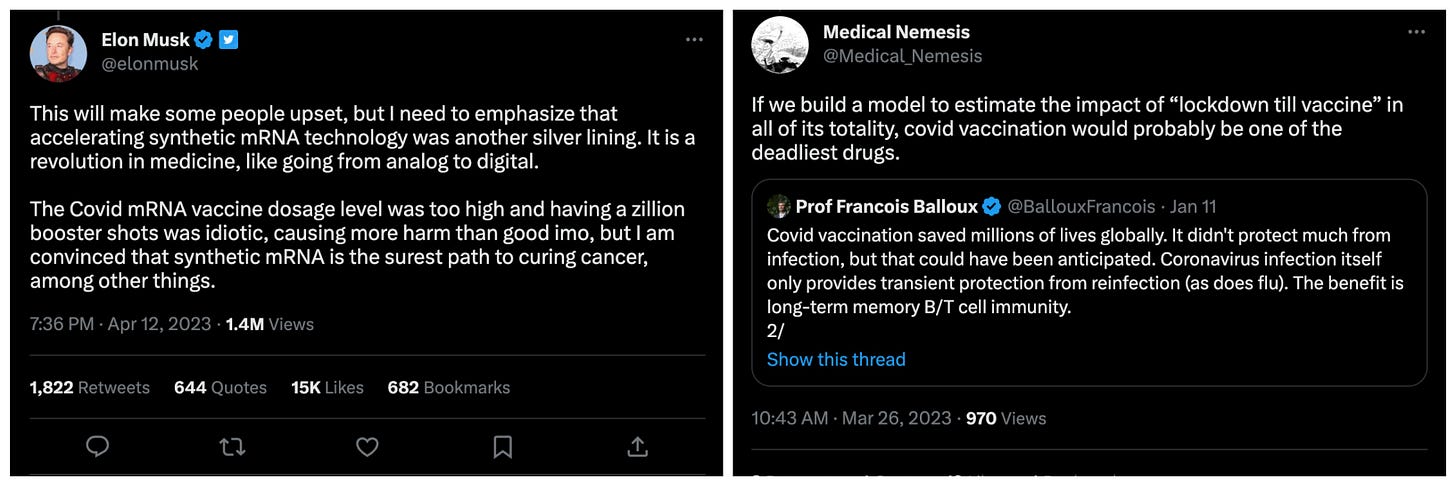“…when social processes are described in terms of their hoped-for results, this obscures the more fundamental question as to just what they actually do - and circumvents questions as to whether doing such things is likely to lead to the results expected or proclaimed.”
Knowledge and Decisions (Sowell 1996, p.x)
Hello,
Only two years after the fact, there are already indications of how the history of the COVID vaccine will be written. Modelling published in The Lancet last summer claimed that the shots had already saved tens of millions of lives. And, not content saving literally millions of hypothetical lives from the coof, it increasingly looks like they may be credited with indirectly with saving millions more from cancer and heart-disease, or Ebola, Zika, Dengue, Chikungunya, and even plague. As the mRNA platform and its COVID-vaxx cousins come to be central in the development of new, cost-effective vaccines for a wide-range of illnesses, there is a good chance that the history of the pandemic will be that of a dark, bewildering time in which sometimes incompetent tried their best and were eventually saved by the STEMettes’ rapid development of a novel and boundlessly life-saving intervention.
In other words, the COVID-vaxx chapter will be seen as ‘a success’, not just in the fight against coof but in mankind’s Great Warre on Pestiferousness and Suffering writ large.
But there is another way of evaluating the vaccine, one that steps back and considers the role(s) it played – and continues to play – beyond its specific medical function of inoculating against disease. It considers the disastrous, liberticidal mitigation policies of the 2020-2022 and notes that amongst their key justifications was the promise of an imminent vaccine. It notes that the burdens of lockdowns and closures were deemed a price worth paying because a vaccine would soon alight to save us. There are many examples of this reasoning in official documentation and speeches from across the world so I’ll somewhat arbitrarily quote a couple here (emphases are, of course, all mine):
WHO’s February 2020 report on China’s COVID-response (co-written by Dr Bruce ‘Huh? What’s Taiwan?’ Aylward):
Much of the global community is not yet ready, in mindset and materially, to implement the measures that have been employed to contain COVID-19 in China. These are the only measures that are currently proven to interrupt or minimize transmission chains in humans. Fundamental to these measures is extremely proactive surveillance to immediately detect cases, very rapid diagnosis and immediate case isolation, rigorous tracking and quarantine of close contacts, and an exceptionally high degree of population understanding and acceptance of these measures. […] Given the damage that can be caused by uncontrolled, community-level transmission of this virus, such an approach is warranted to save lives and to gain the weeks and months needed for the testing of therapeutics and vaccine development.
Professor SIR Neil Ferguson’s team’s March 2020 report on the impact of NPIs of COVID-19 mortality and healthcare demand:
Overall, our results suggest that population-wide social distancing applied to the population as a whole would have the largest impact; and in combination with other interventions – notably home isolation of cases and school and university closure – has the potential to suppress transmission below the threshold of R=1 required to rapidly reduce case incidence. A minimum policy for effective suppression is therefore population-wide social distancing combined with home isolation of cases and school and university closure. To avoid a rebound in transmission, these policies will need to be maintained until large stocks of vaccine are available to immunise the population – which could be 18 months or more.
And, more flamboyantly, Emmanuelle ‘Emmerder les non-vaccinés’ Macron’s March 2020 speech to the French people:
L'Europe a tous les atouts pour offrir au monde l'antidote au Covid-19. Des équipes sont également à pied d'œuvre pour inventer un vaccin. Il ne pourra pas voir le jour avant plusieurs mois, mais il est porteur de grands espoirs. La mobilisation de notre recherche française, européenne, est aussi au rendez-vous et je continuerai de l'intensifier.
Taken at face-value, these suggest that globally the lockdowns and various other restrictions were underwritten by a common narrative in which the vaccine played a starring, messianic role. We didn’t just ‘lockdown’ tout court; we locked down ‘in the hope’ or ‘until the availability’ of vaccines. This means that the costs of lockdown are, in a certain way, the costs of the vaccines – not as a technology for inoculating bodies against infections but as a key player in the human (élite) understanding of what is politically justified and possible. And then, once they arrived, many judged them to legitimise a series of brutalising and divisive mandate policies, including, lest we forget, a sort of quasi-Apartheid in Austria.
On this view – given the enormity of the lockdown’s costs – it is far, far less clear that the vaccination was a ‘success’.






The distinction between these two views is the distinction alluded to by Thomas Sowell in the passage quoted above – it is the distinction between evaluating an intervention based on its intended outcomes (e.g. inoculating large numbers of people against a particular disease) and evaluating it based on a more holistic appraisal of its impacts, be they medical, social, political, or moral.
And, when choosing between the two, it is worth considering the broader point that Sowell draws this distinction in the context of: that by only noting an intervention’s intended outcomes, you risk mis-depicting its actual, real-world consequences and skewing your evaluation. For example, judging my attempt to kill wasp by locking it in a bus full of panda-cubs and driving into the side of an orphanage in terms of my intended outcome alone would be a grotesque mis-evaluation.
The same is true of vaccines. Sure, the vaccine is a tool for inoculating against disease and will likely play an important role in medical development, but it was not just that. It was also a justification for stringent mitigation policies and the basis for social segregation, job-losses, families break-up, and kids missing out on even more schooling. And, for an especially dark period of time (~ early 2021 to mid-2022) it was a marker of purity and impurity for large portions of the population, both vaxxed and unvaxxed. Only an approach that looks beyond the vaccine’s intended outcomes can properly reckon with these facts.
Without commenting further on whether COVID vaccination was a “success” (that is not really my purpose here), it is worth noting the second view’s greater objectivity. Fundamentally, ‘intended outcomes’ are agent-relative – that is, they follow from a particular agent(s)’s subjective judgement of what an intervention is for. And not only does this judgement risk being reductive, it may also be ideologically motivated. For example, do we really live at a time when vaccines can permissibly be seen as anything other than one of science’s greatest triumphs?
The second mode counters this by not tying itself to any agent(s)’s judgement of what interventions are for – not least those of the agents deploying and profiting from them…! Instead, it tries to remain faithful to the richness and complexity of their social existence1. Not only does this allow us to think through the moral and political implications of our actions with greater clarity, it also involves a greater curiosity which, for people interested in making sense of the world, is only ever a virtue.
Before I conclude, I should address the elephant-ass-print denting this post: vaccine injuries and adverse events. Though I think they are real and important for evaluating the success of the COVID vaccines, I’ll explain why I chose not to dwell on them. In general, they are already widely accepted as in-principle relevant to the question by COVID-vaccine triumphalists. Though there appears to have been a concerted attempt to cover them up or downplay their severity, I suspect that almost all the players in this debate would agree that the medical harms and cost/benefit of a medical intervention are, again in-principle, relevant to that intervention’s success.
As such, I felt that dwelling on them would distract from the point that I have tried to make – namely, that vaccines play a political/social/moral role beyond the one assigned to them by biomedicine and thus incur political/social/moral harms that are relevant to evaluating their “success” qua interventions into our lives. Even if the vaccines had been 100% safe and effective, they could still (be argued to) have cost innumerable lives through lockdowns and set a dark precedent for what nominally liberal democracies are willing to do to extract compliance from their subjects.
It is worth remembering that the vaccines don’t need to be toxic for them to have been the source of so much nastiness and evil2.
Anyways - until next time.
Max.
§ P.S. - Some related, thought-provoking pieces for thinking about Vaccines and Vaccination:
- 's own Substack and Twitter-feed (including a piece responding to a question from yours truly 😬).
A good-natured debate between Medical Nemesis and Drs Michel Accad and Anish Koka on The Accad & Koka Report:
Dr Michel Accad’s blog, Alert and Oriented.
Michel Foucault’s essay, The Birth of Social Medicine.
Heidi Larson’s 2020 book, Stuck.
Bardosh et al.’s paper in the BMJ, “The unintended consequences of COVID-19 vaccine policy: why mandates, passports and restrictions may cause more harm than good”
And, of course, the podcast episode that brought me to write this post in the first place - Medical Nemesis being interviewed by Daniel Hadas:
I’m very proud to have played a role in brokering/helping with it!
Maybe the scale of this richness and complexity is such that, in practice, it makes any evaluations of a population-level intervention’s ‘success’ quasi-impossible? If this is the case, then it should raise serious questions about the permissibility or justification for population-level interventions like mass-vaccination or ‘Public Health’. The latter, I admit, is a bit out there and my scepticism has yet to extend that far. However, I would strongly recommend the following podcast episode from the Accad & Koka Report on why consequentialism (in effect, benefit-harm evaluations of the sort I’ve been considering) fails as a way of evaluating Public Health interventions:
This point is drawn from Daniel Hadas’ shrewd observation (I can’t remember where 🫤) that many lockdown-decriers seemingly slid into out-and-out vaccine-scepticism because they couldn’t conceive of something used to justify so much harm turning out to be safe and/or effective.





Great read Max, and I learned a new word ("liberticidal").
I agree with all your points and that Sowell quote is so pertinent.